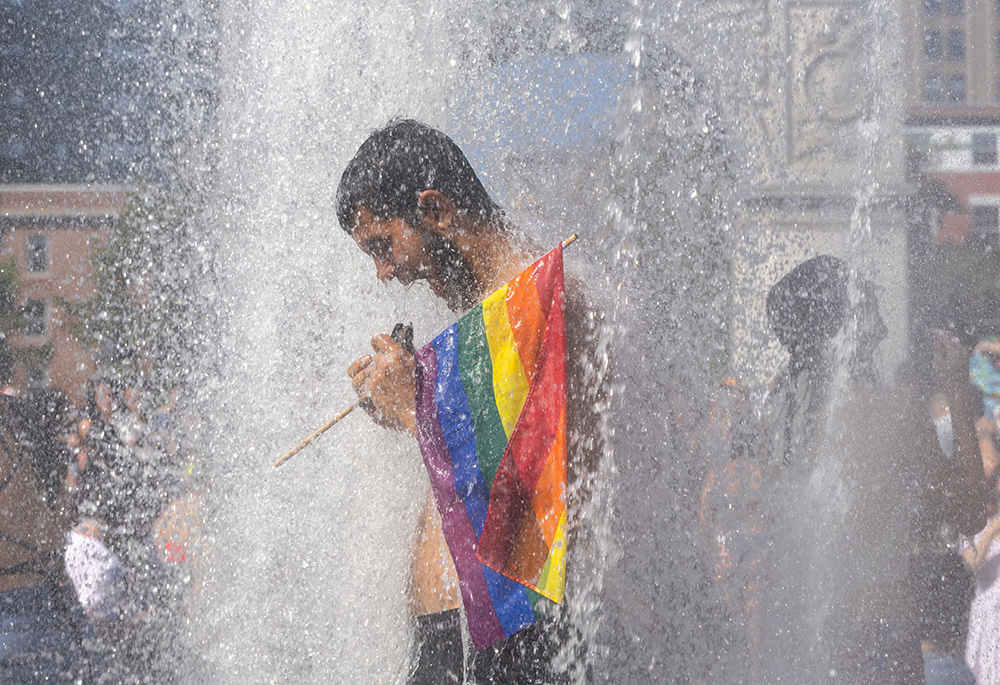
A lay-led initiative in the Archdiocese of Chicago consulted dozens of LGBTQ Catholics who attend the ministry's sponsored Masses and people from the greater LGBTQ community during the grassroots consultation ahead of the 2023 Synod of Bishops in Rome. Pictured is a man cooling off in a fountain in Washington Square Park June 26 in New York City. (CNS/Reuters/Jeenah Moon)
Inmates, college students, climate activists, LGBTQ people, clergy sex abuse survivors, health care professionals, church reform advocates and older Catholics are among those who have participated in their own listening sessions for the grassroots consultation that has been held ahead of the 2023 Synod of Bishops in Rome.
In all, 110 non-diocesan Catholic groups—universities, advocacy nonprofits, religious congregations, ministries and private associations of individuals, among others — submitted their own synodal "synthesis" reports this year to the U.S. Conference of Catholic Bishops, said Julia McStravog, a consultant helping to coordinate the bishops' synodal work. Those groups' reports were to be synthesized along with those of 178 Latin Rite dioceses in the United States into a 10-page document that the bishops' conference was scheduled to submit to the Vatican's General Secretariat of the Synod of Bishops in late August.
A previous NCR review of more than a dozen diocesan synod reports across the country found that majorities of Catholics who participated in listening sessions over the past year want a welcoming church that reaches out to the marginalized, especially the LGBTQ community, and that allows women to serve in leadership positions, including ordained ministry.
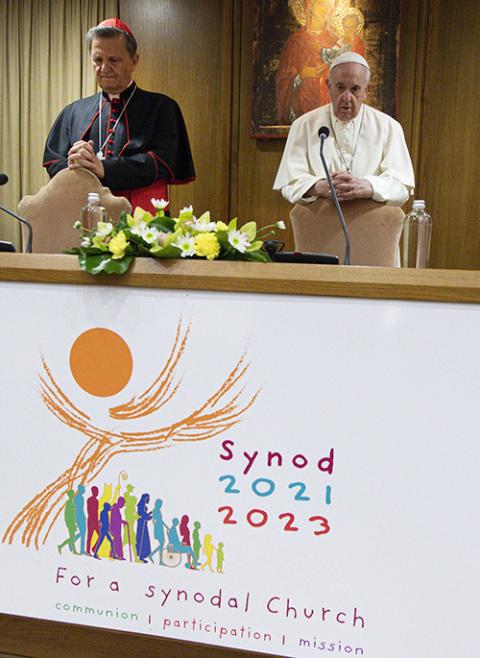
Pope Francis leads a meeting with representatives of bishops' conferences from around the world at the Vatican Oct. 9, 2021. Also pictured is Maltese Cardinal Mario Grech, secretary-general of the Synod of Bishops. (CNS/Paul Haring)
Some of the non-diocesan synod reports that NCR reviewed for this story emphasized similar themes, but also highlighted other issues, such as climate change, the plight of the incarcerated, the concerns of college students, the lingering sense of betrayal experienced by clergy sex abuse survivors, and the various obstacles to accessing quality health care that remain for millions of Americans.
The bishops' conference organized the non-diocesan groups into their own special "region" — "Region 16" — to accompany the 14 geographical regions for dioceses and one region for Eastern-rite eparchies. McStravog told NCR that "Region 16" gave people the opportunity to engage in the synod, especially those who felt that they lacked the same chance to be heard in their own parishes or dioceses.
"Region 16 provided an opportunity for a wide representation of voices to be heard," Richard Coll, executive director of the U.S. bishops' Department of Justice, Peace and Human Development, told NCR in a recent interview.
Described by some observers as "the biggest consultation exercise in human history," the 2021-23 Synod of Bishops' two-year process of global listening and dialogue is set to culminate in an October 2023 gathering of bishops and synod delegates in Rome. Pope Francis and other church leaders have framed synodality as a decisive step in the church's renewal that the Second Vatican Council proposed more than a half century ago.
What follows are brief summaries of eight such groups' synodal reports:
Archdiocesan Gay and Lesbian Outreach
Archdiocesan Gay and Lesbian Outreach, or AGLO — a lay-lead initiative that enjoys a quasi-official status with the Archdiocese of Chicago — consulted the dozens of LGBTQ+ Catholics who attend the ministry's sponsored Masses as well as people from the greater LGBTQ+ community.
What the ministry heard was that many LGBTQ+ Catholics experience a deep internal struggle in trying to reconcile their sexual orientation and gender identity with their identity as Catholic. Many expressed difficulty in coming out as Catholic and LGBTQ+, as many of their peers often wonder, "How can you be both?"
"There is a heartfelt need for love and support, accompaniment, and help with discernment for the LGBTQ+ community," the AGLO synodal synthesis report says.
The AGLO report also indicates that LGBTQ+ Catholics desire to grow spiritually and to remain connected to God through prayer, community, liturgy and social justice. The LGBTQ+ Catholic community does not want to be separated from other baptized Catholics but desires to be accepted as beloved children of God who are made in the divine image.
The group's synod report reads, "We believe the Church gives us grounding, a home, a means to discern, and a connection to the Body of Christ and the Holy Spirit. What we believe is missing from today's Church is the Spirit and actions of Jesus Christ."
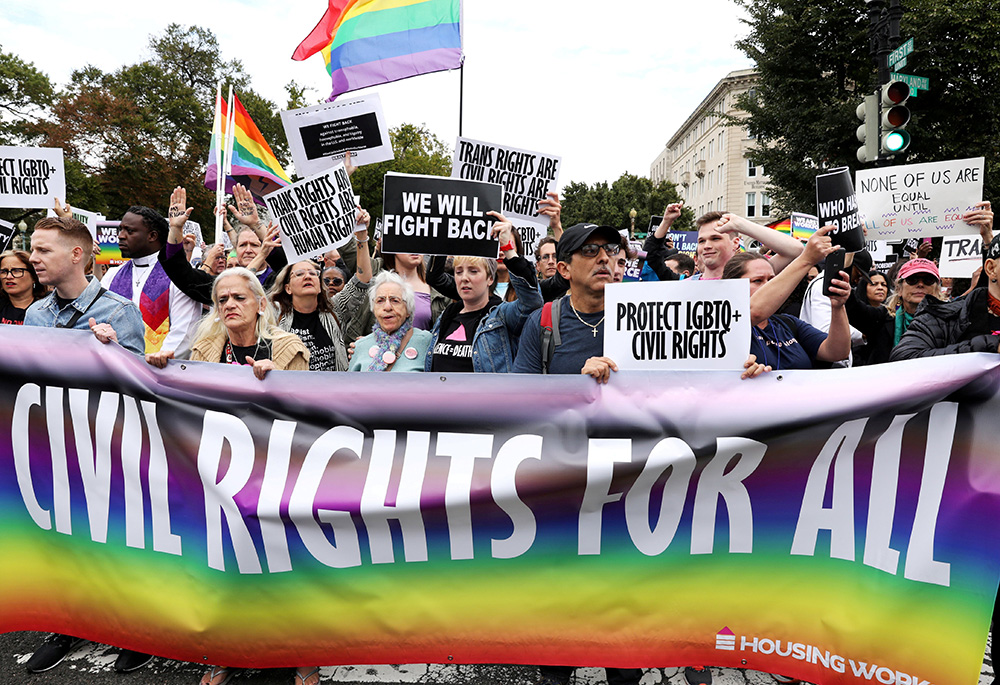
Pictured in this Oct. 8, 2019, file photo are LGBT activists block the street outside the U.S. Supreme Court in Washington. (CNS/Reuters/Jonathan Ernst)
Forty-six self-identified sex abuse survivors participated in two virtual listening sessions hosted by Awake Milwaukee, a lay-led advocacy group that supports clergy sex abuse survivors. What they and their allies made clear in those sessions is that the crisis is not in the past; sexual abuse is still happening in the Catholic Church.
"My abuse began in 2018. I just don't understand why they don't tell the truth. It's now. I need them to acknowledge that it's now," said one survivor who was quoted anonymously in the report.
The survivors described feeling pain, anger, sadness, shame and post-traumatic stress long after the initial abuse. They said they are often ignored, dismissed and shunned by their church communities. They spoke of a profound loss of trust in the church.
"I went from being a devoted Catholic to one feeling betrayed and disillusioned by the abuse and cover-up," one survivor said, according to the report.
Still, several survivors spoke of a longing for the Catholic Church to return to its roots, for transparency and accountability among church leaders, and for the wider Catholic community to be aware of survivors' trauma to make the church a safe place for all people.
Said one survivor, "I am separated from the Church but not from my God."
In June, Call to Action's chapter in New York City organized listening sessions for men and women who had recently been released from prison. The organization also sent more than 100 questionnaires to men and women who are currently incarcerated.
The participants said they desired accepting communities in local churches and that they wanted to be treated equally regardless of their race — they were mostly people of color — or experience in the criminal justice system.
"Be supportive and accept my shortcomings and not judge me for my past," said one participant who was quoted in the report.
Participants said they were looking for "healing homilies" after prison that deal with "real world problems from their day-to-day life." They believed that prison chaplains should be given more responsibility to support the incarcerated as they transition from prison to the community. Many hope for more advocacy from the church on their behalf regarding criminal justice reform, especially on matters related to ending solitary confinement.
"I would like to see the church create its own innocence project to help exonerate innocent Catholics," one participant said, according to the report.
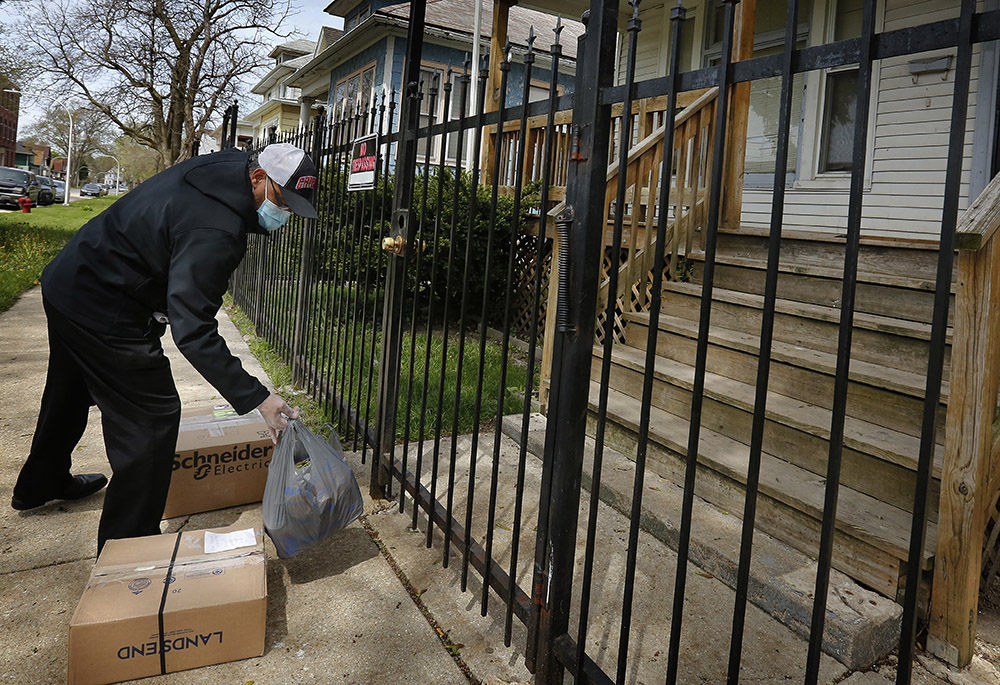
Pictured is Chicago Deacon Pablo Perez of Kolbe House dropping off donations at a halfway house for men recently released from jail May 4, 2020. (CNS/Chicago Catholic/Karen Callaway)
In six small virtual group conversations hosted by the Catholic Climate Covenant this year, people from more than 25 states shared how they had implemented Laudato Si' action plans.
But efforts to carry out Pope Francis' ecological vision were often the results of dedicated groups of parishioners and clergy rather than a unified diocesan response. In many cases, participants said they had little to no support from the hierarchy and church institutions on issues of creation care.
"We heard more often, expressions of sorrow and disappointment in the lack of dedicated or consistent support from bishops, priests and other Church leaders to live out the call to care for creation," the Catholic Climate Covenant wrote in its synodal synthesis report.
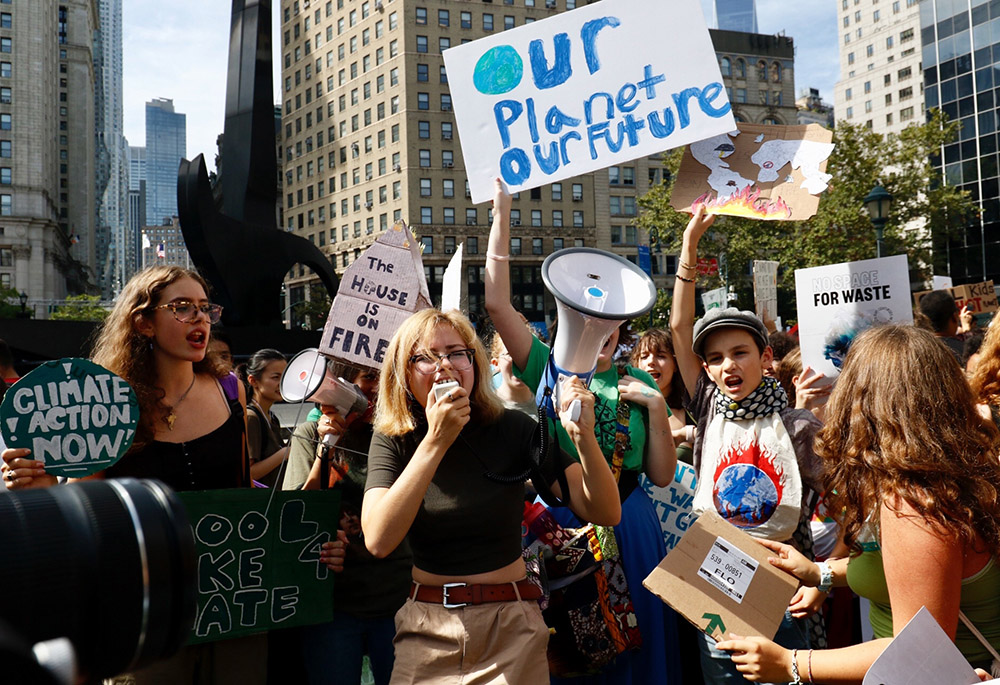
Young people gather for a climate change rally Sept. 20, 2019, in New York City. (CNS/Gregory A. Shemitz)
In an online survey, respondents said activities inspired by "Laudato Si', on Care for Our Common Home" are happening in parishes but not without difficulties because of a lack of leadership support. In several of the virtual meetings, participants described the feeling of an "uphill battle" in trying to work with priests on issues pertaining to creation care.
The Catholic Climate Covenant also consulted students from Creighton University in Omaha, Nebraska. The students expressed frustration, fear and uncertainty regarding climate change, which they said is not talked about or recognized as an important aspect of the Catholic faith in their home dioceses.
"All the students hoped that the Catholic Church would offer a unified response to climate change and spread those teachings to every diocese and parish," the report says. "The students recognized the power and influence that the Catholic Church has on the Church's constituency and secular society."
Advertisement
Catholic Health Association of the United States
The Catholic Health Association of the United States, or CHA, used its synodal synthesis report to highlight how the health of vulnerable populations is compromised due to racial injustice, the climate crisis, immigration status and lack of health insurance.
The CHA synod report also underscores how gender and sexual orientation discrimination impacts health care outcomes, noting that Catholic health care providers are seeing an increase in LGBTQ adults and minors seeking care.
"Catholic health care must follow the science. Reluctancy to honor widely accepted standards of care jeopardizes medical credibility overall," says the CHA report, which adds that Catholic health care "must listen carefully and develop plans to accompany" LGBTQ patients and their families "through a journey of diagnosis and treatment as fully as possible."
The synod report says that the Catholic Health Association of the United States has committed to breaking through health care barriers that still exist because of systemic racism and social prejudices. The report also says that climate change represents "one of the most significant threats to human health in the 21st century" and that CHA is working with the Vatican's Dicastery for Promoting Human Development to raise awareness of and enrollment in the Laudato Si' Action Platform.
The Catholic Health Association also said it is working with its member organizations to create "a uniform set of core elements and benchmarking measures" to help ensure the unique identity of Catholic health care providers.
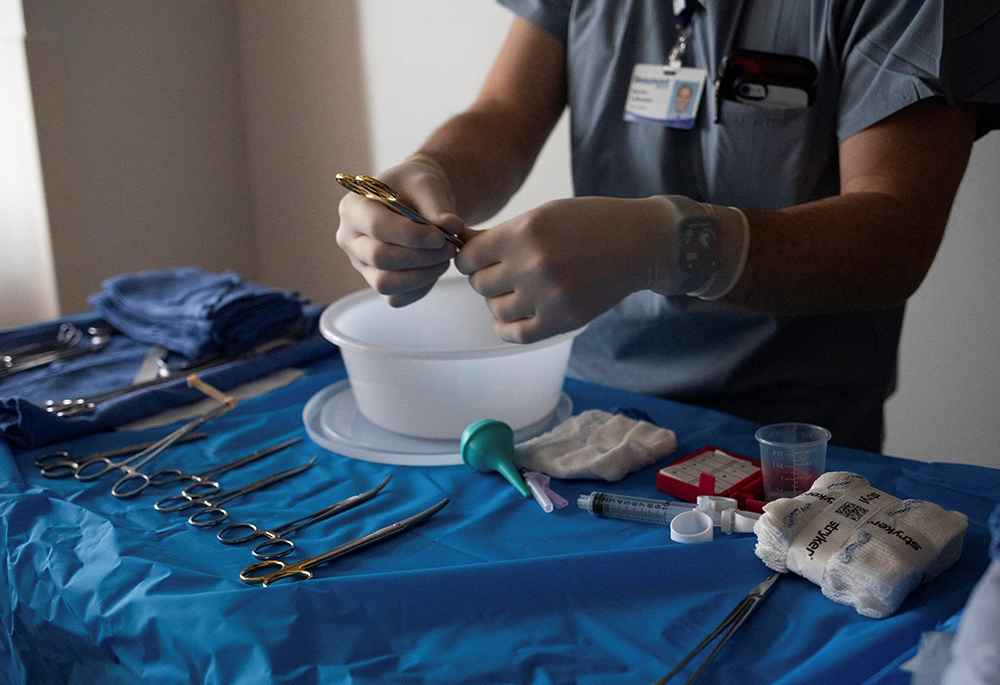
A doctor at Beaumont Hospital in Royal Oak, Michigan, prepares medical supplies Feb. 1. (CNS/Reuters/Emily Elconin)
Catholic University of America
About 140 students and staff of the Catholic University of America participated in three small group listening sessions to reflect on questions pertaining to life on campus, the university's mission and Catholic values.
According to the university's synodal report, a major theme that emerged was that the need for healing and reconciliation is universal: "Our sense of being hurt, and wanting to be forgiven for having hurt others, was 'common ground' and a powerful starting point for dialogue."
The report said the discussions underscored the importance of community, both as a source and fruit of reconciliation. Participants emphasized the importance of communication. They also appreciated the opportunity to discuss campus matters in synodal listening sessions. "This was true even for participants who were initially skeptical of the synodal process," the report says.
Participants said the Catholic University of America ought to be a place where genuine dialogue "takes place on a more regular basis," and that they had come to understand synodality as a way of being church in the world today.
The university's synod report said, "Perhaps the greatest testament to the synod was the number of participants who expressed a hope that something like the synod listening sessions would continue in the future."
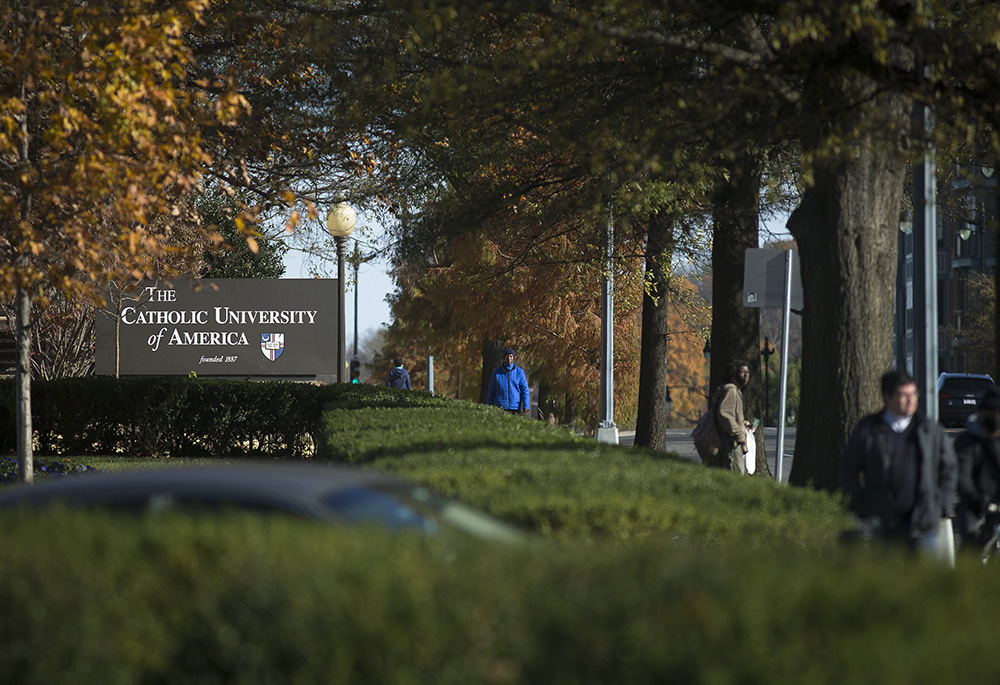
People in Washington walk near the campus of the Catholic University of America Nov. 24, 2020. (CNS/Tyler Orsburn)
A group of about 70 lay Catholics, most of them older adults, organized two listening sessions in Missoula, Montana, in March and April. They reflected on why Catholics in their local diocese have been leaving the church and what specific steps or changes they would like church leaders to implement.
They accused the institutional church of pushing people away and retreating from the reforms of the Second Vatican Council while focusing on doctrine and dogma at the expense of God's love and mercy.
"We have permitted canonical/liturgical rules to petrify our relationship with God and our neighbors," one anonymous participant said, according to the report.
The participants — including homemakers, scientists, university professors, clerical workers and medical professionals — recommended changing canon law to make parish councils mandatory in every parish, proposed reforming priestly formation, called for women to have leadership roles and be ordained deacons, said laity should be permitted to preach at Mass, and added that the church needs to become less judgmental and more welcoming.
Both listening sessions were conducted with no clergy present, which helped participants feel free to express their thoughts, the report said.
"The group also found a sense of hope in the synodal process, something they have not felt in quite some time," the group's report said.
Many of the themes in Voice of the Faithful's synodal synthesis report echo those found in dioceses across the country. Participants in Voice of the Faithful's listening sessions said they yearn for inclusive, Christ-centered local faith communities offering fellowship, spirituality, safety and moral values, joined in unity with the universal church.
However, the report filed by Voice of the Faithful, a reform group founded in 2002 to in response to the clergy sex abuse crisis, identified several gaps that the group said still exist between that hopeful vision of a welcoming church and the day-to-day lived reality of parish life.
"Stories of how a new pastor, and sometimes a new bishop, eliminated all the existing programs in a parish or fired all the staff far outnumbered those describing good parishes," the report says.
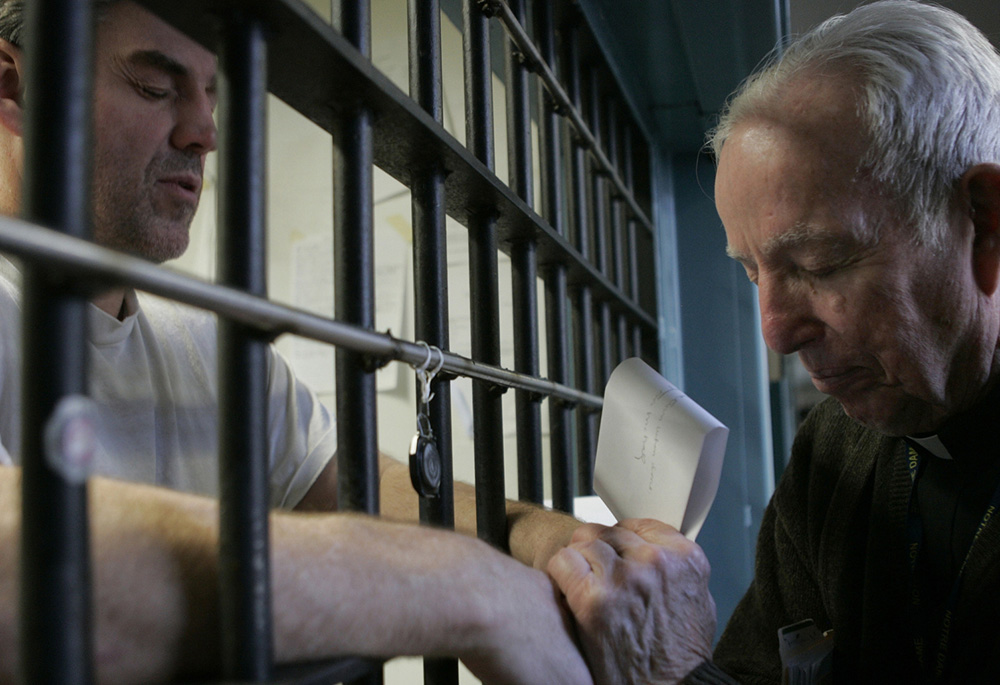
Voice of the Faithful's synodal synthesis report said that incarcerated people are among groups the church marginalizes. In this 2008 file photo, a priest prays with a death-row inmate at Indiana State Prison in Michigan City, Indiana. (CNS/Northwest Indiana Catholic/Tim Hunt)
Those who are often marginalized by the church today, the report said, runs the gamut from women, people of color, and LGBTQ+ Catholics to migrants, refugees, the incarcerated, those with disabilities and unmarried couples who seek to baptize their children.
Participants said the laity need to be included in church governance, including in the selection of new bishops and pastors. They called for women to be given positions of authority in the church and for priestly training and formation to be overhauled.
A Christ-centered church of the 21st century, the Voice of the Faithful report said, must return to basic principles, to a synodal discernment and to remain faithful to the path that Jesus reveals to Christians.







